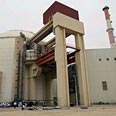
US: Iran could revive atom bomb bid due to IAEA curbs
US envoy to IAEA says intelligence report on Iran's nuclear program indicates country could easily revive atomic works, especially in light of limits on nuclear watchdog's activity. NIE's findings made it more, not less, urgent that Iran cooperate quickly with IAEA, he stresses
The United States said on Friday that what US intelligence found to be a secret Iranian nuclear arms program halted in 2003 could easily be revived because of later curbs on UN inspections in the country.
The US ambassador to the International Atomic Energy Agency challenged suggestions that the US intelligence finding disclosed on Dec. 3 reduced the urgency of reining in Iran via IAEA investigations, UN sanctions and steely diplomacy.
US Envoy Gregory Schulte said Washington's National Intelligence Estimate (NIE) contained "new evidence" of a concerted, clandestine atom bomb project in Iran and there was no reason to relax even if it was shelved four years ago. "Iran's leaders could choose to restart that program, just as they restarted uranium enrichment (in 2006, after a two-year pause under international pressure)," he told invited reporters.
"There is no certainty that the IAEA would know, particularly with the (IAEA) director-general twice warning us that IAEA knowledge of Iran's current activities is diminishing. That is a matter of grave concern."
'Iranian technology could be applied for bomb'
Schulte was referring to restrictions on IAEA inspections beyond a few declared nuclear sites imposed by Iran in early 2006 in retaliation for UN Security Council steps to slap the first of two sets of sanctions on Tehran.
"The technology that Iran is mastering today for enrichment, a capability not necessary for Iran to have a peaceful nuclear program, could be readily applied to building a bomb, should Iran's leaders so decide," he said.
Schulte also said the NIE's findings made it more, not less, urgent that Iran cooperate quickly and completely with an IAEA inquiry to resolve questions about past Iranian nuclear activity that raised suspicions of military involvement.
"We still expect full disclosure but now we think they have even more to disclose as a result of the NIE," Said Schulte.
Rice: Iran, Syria must change their policies
Meanwhile, Secretary of State Condoleezza Rice said Friday the United States remains open to negotiations with Iran and Syria if both these countries change what she characterized as confrontational policies in the Middle East.
Rice said the US would not meet with the top Iranian leaders until they suspend their uranium enrichment program, a stance she said is supported by the UN Security Council. Even a short suspension of Tehran's enrichment program, which could lead to the fissile material needed for an atomic weapon, would be welcome, she said.
"As long as the Iranians are talking and practicing enrichment, we're not getting anywhere," Rice said.










